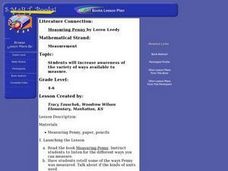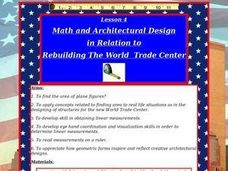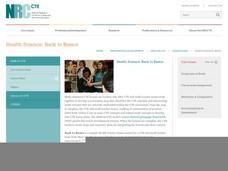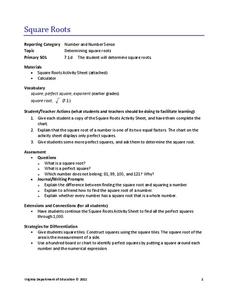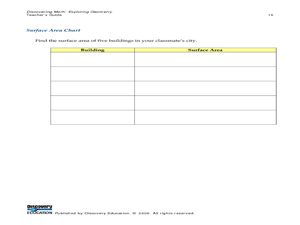Curated OER
"Measuring Penny" by Loren Leedy
Students increase awareness of the variety of ways available to measure.
Curated OER
Math and Architectural Design in Relation to Rebuilding The World Trade Center
Learners discover building plans and practice reading measurements. In this architectural design lesson, students investigate the areas of the specific World Trade Center locations that need to be rebuilt and determine the cost....
Curated OER
Comparison of Two Different Gender Sports Teams - Part 1 of 3 Measures of Central Tendency
Students gather and analyze data from sports teams. In this measures of central tendency lesson, students gather information from websites about sports team performance. Students analyze and draw conclusions from this data. This lesson...
Curated OER
Measuring Using Leaves
Students explore geometry by using non-standard measuring methods. In this length estimation lesson plan, students complete a worksheet in which different objects in their classroom are measured by three different sized leaves. Students...
Curated OER
Frequency Distributions and Measures of Central Tendency
Twelfth graders use the Internet to research information on NFL players and construct frequency distributions from the data. They calculate the mean, medium and analyze their data.
Curated OER
Measurement Enrichment Worksheet- Using Mouse Measures
In this measurement enrichment worksheet, 2nd graders use a picture of a mouse as a unit of non-standard measurement to complete a chart. They record the shortest items and longest item in 2 questions below the chart.
Curated OER
Paper Clip Path- Using Paper Clips to Measure
In this paper clip measurement worksheet, 1st graders cut out pictures of paper clips at the bottom of the page. They use the pictures to measure how many paper clips it takes to follow two paths. They color the shorter path blue.
Curated OER
Oodles of Noodles
Students investigate non-standard and standard measurement including inches and centimeters. They use different types of noodles as non-standard units of measurement comparing them to inches and centimeters.
National Research Center for Career and Technical Education
Health Science: Back to Basics
This lesson focuses on unit conversion, proportions, ratios, exponents, and the metric system. Discuss measurement with your math class and demonstrate how to solve several health-science word problems. Give learners a chance to visit an...
Curated OER
Is Your Money Rolling Away?
Young scholars demonstrate how to solve word problems. They will watch the video "Math Can Take You Places" and identify three problem solving strategies.
Curated OER
Hands Around The World
Students engage in a lesson that is concerned with the concept of measurement. They conduct an experiment by measuring the amount of children needed to cover the distance of 50 yards. They calculate the distance around the world and how...
Curated OER
Great Designs
In this measuring worksheet, students use a centimeter ruler to measure the perimeter of 3 figures. They then draw 4 shapes in the grid on the page.
Curated OER
Boomerang
Students explore the concept of boomerangs. For this boomerang lesson, students throw homemade boomerangs at different angles to record maximum distance and if it returned or not. Students collect their boomerang data then create a...
Virginia Department of Education
Square Roots
Square away any doubts about using a new resource. Pupils learn about squares and square roots in the mini-instructional activity. They complete a worksheet identifying roots of perfect squares up to 400.
Curated OER
Making Simple Conversions
Young scholars explore the concept of measurement as it relates to equivalencies. They complete simple conversions using visual models of measurement units, and record their answers in a two-column table.
EngageNY
Inscribed Angle Theorem and Its Applications
Inscribed angles are central to the instructional activity. Young mathematicians build upon concepts learned in the previous instructional activity and formalize the Inscribed Angle Theorem relating inscribed and central angles. The...
EngageNY
Using Sample Data to Compare the Means of Two or More Populations II
The 23rd segment in a series of 25 presents random samples from two populations to determine whether there is a difference. Groups determine whether they believe there is a difference between the two populations and later use an...
Curated OER
Measuring Speed With iMovie
Young scholars record each other running, walking, throwing a ball, or doing a similar activity for a set distance. They import the video clips into iMovie. They compute how long it took in miles per hour.
EngageNY
From Circle-ometry to Trigonometry
Can you use triangles to create a circle? Learners develop the unit circle using right triangle trigonometry. They then use the unit circle to evaluate common sine and cosine values.
EngageNY
Looking More Carefully at Parallel Lines
Can you prove it? Making assumptions in geometry is commonplace. This resource requires mathematicians to prove the parallel line postulate through constructions. Learners construct parallel lines with a 180-degree rotation and then...
EngageNY
Using Trigonometry to Determine Area
What do you do when you don't think you have enough information? You look for another way to do the problem! Pupils combine what they know about finding the area of a triangle and trigonometry to determine triangle area when they don't...
EngageNY
Secant Lines; Secant Lines That Meet Inside a Circle
Young mathematicians identify different cases of intersecting secant lines. They then investigate the case where secant lines meet inside a circle.
EngageNY
Fundamental Theorem of Similarity (FTS)
How do dilated line segments relate? Lead the class in an activity to determine the relationship between line segments and their dilated images. In the fourth section in a unit of 16, pupils discover the dilated line segments are...
Discovery Education
Discovering Math: Exploring Geometry
Apply geometric properties and formulae for surface area and volume by constructing a three-dimensional model of a city. Learners use similar and congruent figures and transformations to create a city of at least 10 buildings. They trade...


